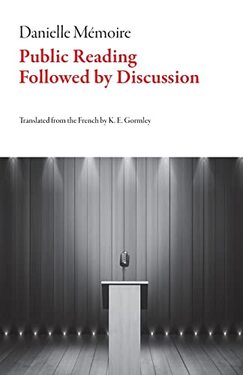When reading a book you can reasonably expect a clear delineation of author, reader, and character. Not so in Danielle Mémoire’s 1994 literary exercise, Public Reading Followed by Discussion (tr. K.E. Gormley, 2021), which ditches such expectations and serves a metafictional who’s who of readers who may be authors who may be characters. With the exception of occasional stage directions and a dusting of narrative asides, the whole book is formed of unattributed dialogue. It makes sense since the central idea is that someone is reading and the subsequent Q&A is similarly verbal.
The story opens with an author (who’s a character) invited to do a public reading (so, a reader too!) followed by a discussion on a work-in-progress, which turns out to not be in progress. Clearly without something to read this causes consternation with the crowd. But when the words ‘end quote’ appear then it becomes clear that this was also the public reading. And when the discussion begins, that turns out also to be a public reading. As each section concludes with ‘end quote’ (how otherwise would the audience recognise that mark sitting silent on the page?), or some witty variation, we’re never quite sure where the reading began.
Mémoire uses this deliberate gallimaufry of authors, readers, and characters, and stories within stories to discuss literature and the nature of a work, allowing disgruntled audience members to question what they’ve just heard, something that later audiences, in later discussions, will probe further on, leading the discussion in new directions. But with a series of nested stories rapidly unravelling, we can never assume that each reader (or writer) is the same person each time (we can never be sure they aren’t, either).
With references to works by, amongst others, Joyce, Proust, and Nabokov and with other characters and narratives slipping in and out I found it an interesting work (I typically love these sort of playful metafictional morsels) but also frustrating overall in that even in explaining itself I feel there’s more unsaid. But then, when I don’t get all Mémoire’s references, as the text acknowledges, I’m not the ideal reader to be at such a reading.
